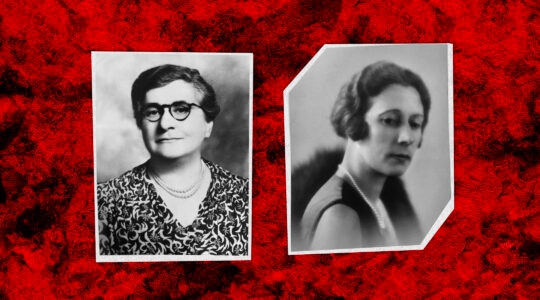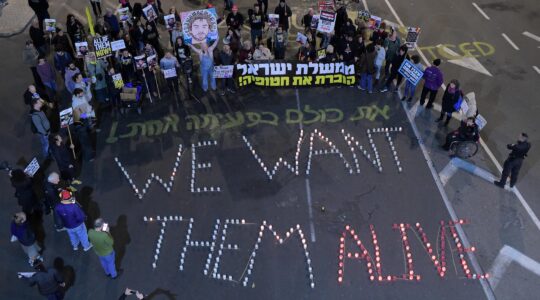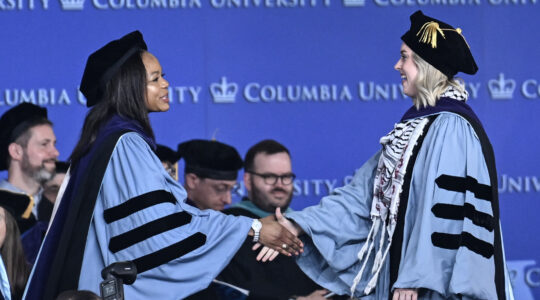‘He’s making a list, he’s checking it twice.” These lyrics were first made famous by Eddie Cantor in November of 1934, when he sang Coots and Gillespie’s “Santa Claus Is Comin’ to Town” on his radio show. The new song became an instant hit, and how could it not have?
It was the height of the Great Depression, people were hurting and who didn’t want to believe that gifts were on their way, at least for the children — that everything we hope for would come to pass — if only we behaved well, as the song suggests.
But what has all this to do with Chanukah? Quite a bit, actually, and especially as we live through a time in which hopelessness and negativity continue to rise in almost all sectors of our society. It even has to do with list-making, but not so much making lists of presents we hope to get or give this Chanukah, as lists of gifts we have received over the past year or more — the kinds of gifts that have helped us to become our best selves and to accomplish those things of which we’re most proud. After all, there is no Chanukah light — no menorah candles burning brightly — without that kind of gifting.
As important as each night’s Chanukah candles are, and as exciting as it is to witness their growing light and warmth with each successive night, without that “extra” one known as the shamash — the one candle that has no halachic significance and is there for “purely utilitarian purposes” — none of it would be possible. Without the shamash, which literally means servant, the “important” candles would not exist. They can’t light themselves, after all.
The shamash reminds us that our greatest achievements and happiest moments don’t happen without some help from others — help that lights up our lives as the shamash lights up the other candles that we kindle for eight nights. The shamash is both completely essential and yet it exists not at all for its own sake.
The shamash exemplifies servant leadership, and we can all learn from its example. It exists to serve, and by serving, it leads the way — lighting the way to our fulfilling the mitzvah of proclaiming the miracles of Chanukah, and basking in the glow of the other candles and the amazing story they celebrate.
Servant leaders are bold in that they’re willing to go first, and modest in that they know that accomplishing anything grand will be about more than themselves or their leading role. Servant leaders maximize both their own capacity and that of others because they know that big jobs require many hands to complete. They know that personal credit is not zero-sum, and often, not at all important, especially when it comes to seeking it for themselves.
Just as each Chanukah menorah is served by a shamash made of wax or wood, each of our lives has almost certainly been enhanced by a shamash of flesh and blood. In fact, each of us has achieved great things in our lives because of some combination of our own will and hard work, and because someone or something beyond ourselves has led us to greatness by serving or caring for us.
As we enjoy the sight of the shamash-led lights of our chanukiot, or of the many other wondrous stories and achievements that are part of our lives, we have a moment to recall that each of us can be a shamash to others — serving them in ways that fire them up, helping them to achieve their own greatness — not to mention to unique elements of our own that only emerge when we act as servant leaders.
So before the holiday concludes, consider making a couple of lists of your own. Two, in fact. Make one list of eight people who either are, or have been, a shamash in your life. Then make a list or eight people or causes for whom you either currently play, or could play the role of servant leader. With those lists in hand, you might return to the wisdom of Pirkei Avot 1:14: “If I am not for myself, who will be for me? When I am only for myself, what am I? And if not now, when?”
Chanukah in general and the shamash in particular offer us the chance to live by the wisdom of the Mishnah especially deeply and especially joyfully. And it still leaves room for sharing a very special Chanukah gift — the gift of gratitude.
Try thanking eight unsung or under-sung heroes for their service in your own life. They may serve you directly, the community to which you belong or the nation as a whole.
In thanking them, you will experience how sharing the gift of gratitude brightens not only the lives of those you thank, but how it helps your own light to burn that much more brightly.
Rabbi Brad Hirschfield is president of Clal — The National Jewish Center for Learning and Leadership and co-founder and executive editor of TheWisdomDaily.com
The New York Jewish Week brings you the stories behind the headlines, keeping you connected to Jewish life in New York. Help sustain the reporting you trust by donating today.




